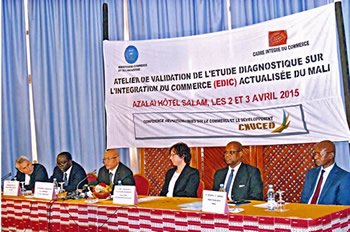In Bamako, Mali, representatives from the government, the private sector, international organizations, academia and the civil society validated an UNCTAD-led update of the country's Diagnostic Trade Integration Study (DTIS) during a two-day workshop on 2-3 April 2015.
Representatives of 94 different entities participated in the event and held discussions on the content of the DTIS update within thematic groups.
At the end of the two-day workshop, the updated DTIS was validated by the Government and national stakeholders, and an Action Matrix - a list of priority reforms - approved.
The workshop was opened by General Secretary of the Ministry of Trade and Industry Sidi Mohamed Ichrach following welcome statements made by Stefano Inama of UNCTAD, Mbaye Ndiaye Enhanced Integrated Framework (EIF) coordinator and Boubou Dramane Camara UNDP Country Director.
Over the two days, the EIF National Coordinator Mohamed Sidibé and other national and international experts, as well as UNCTAD staff members, presented the updated DTIS, moderated working groups and answered questions from the audience.
In a presentation on trade policy and market access, Mr. Inama highlighted the crucial role played by the productive capacities for an effective integration of Mali into the world economy.
Beyond the need to adopt a broad and modern trade policy vision aiming at positioning the country along the global value chain through the development of the services and investment sectors, Mr. Inama also stressed the necessity for such a vision and associated reforms to be carried forward under the leadership of the Ministry of Commerce.
UNCTAD representatives and international and national consultants collaborated to make presentations on constraints, challenges and recommendations.
More precisely, discussions were held on:
-
The business environment and institutional coordination
International consultant Patrick Plane and Malian official Zeinabou Keita made a presentation about Mali's business climate, private sector institutions and trade in services and investment. They developed recommendations on how to improve the regulatory and institutional framework.
-
Trade facilitation, transit and trade policy
International consultant Jean Acri and senior Malian customs official Célestin Maiga focused on trade facilitation and transport. They explained state of progress of the World Trade Organization's Trade Facilitation Agreement while identifying the main challenges and key factors for its successful implementation.
-
Agriculture and fishery sectors
National consultants Mr. Boukenem and Mr. Diakite presented an analysis of these potentially important sectors. Identifying the problems of re-exportation as well as the intention to improve transformation and packaging methods, geographical indications were identified as possible option.
Diagnostic Trade Integration Studies evaluate internal and external constraints on a country's integration into the world economy, and recommend areas where technical assistance and policy actions can help the country overcome these barriers.

 In a presentation on trade policy and market access, Mr. Inama highlighted the crucial role played by the productive capacities for an effective integration of Mali into the world economy.
In a presentation on trade policy and market access, Mr. Inama highlighted the crucial role played by the productive capacities for an effective integration of Mali into the world economy.